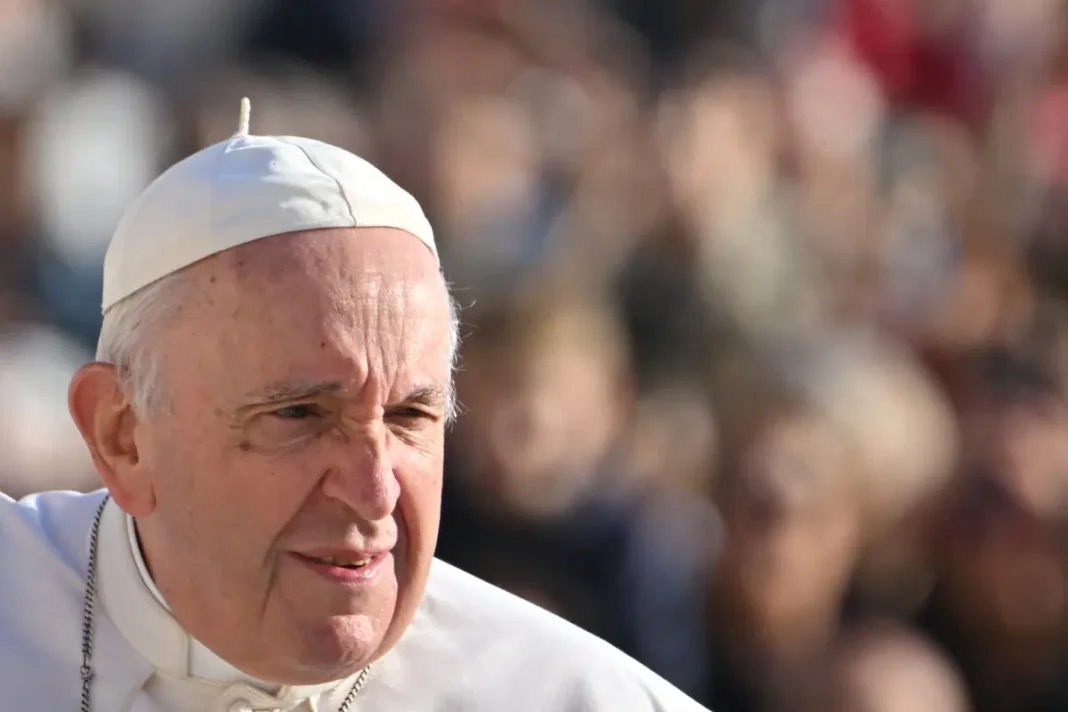Pope Francis has passed away at the age of 88, the Vatican announced yesterday, revealing that he died of a stroke that led to a coma and irreversible heart failure. His death occurred at his residence in Casa Santa Marta, Vatican City, a day after he celebrated Easter and addressed thousands during Easter Mass.
Born Jorge Mario Bergoglio, the late pontiff had battled a prolonged illness. He was hospitalized on February 14, 2025, at the Agostino Gemelli Polyclinic Hospital due to severe bronchitis, which later developed into bilateral pneumonia. After 38 days in the hospital, he returned to his Vatican residence to continue his recovery.
Announcing his death, Cardinal Kevin Farrell, Camerlengo of the Holy Roman Church, said:
“Dearest brothers and sisters, with deep sorrow, I must announce the death of our Holy Father Francis… His entire life was dedicated to the service of the Lord and His Church.”


Simple Funeral as Requested
Catholic tradition mandates burial four to six days after a pope’s death. According to Matteo Bruni, Director of the Holy See Press Office, Pope Francis may be buried on Wednesday, April 23, 2025, following his request for a simple funeral.
Archbishop Diego Ravelli, Master of Apostolic Ceremonies, confirmed that the late Pope had requested simplified rites to reflect faith in the Risen Christ.
“The funeral will emphasize that the Pope is a pastor and disciple of Christ, not a worldly dignitary,” Ravelli said.
Nigeria Mourns
President Bola Tinubu, Labour Party leader Peter Obi, and former Vice President Atiku Abubakar joined other Nigerians in mourning.
President Tinubu praised the Pope as “an instrument of peace” and “a steadfast advocate for the developing world.”
“His passing, just after Easter, symbolizes a sacred return to his maker,” Tinubu noted.
Peter Obi called him a “moral compass” and remembered meeting him three times.
“He embodied the virtues of faith, hope, and compassion,” Obi wrote on X.
Atiku Abubakar described Pope Francis as “a shepherd of the most vulnerable,” adding that his death marks the end of an era defined by humility and moral courage.
The Christian Association of Nigeria (CAN) also paid tribute. CAN President, Archbishop Daniel Okoh, said:
“His legacy has left an indelible mark on Nigeria. He strengthened our Church by appointing Nigerian bishops and cardinals.”


World Leaders Pay Tribute
Condolences poured in from leaders across the globe:
- Iran: Foreign Ministry spokesperson Esmail Baqaei expressed condolences to Christians worldwide.
- Israel: President Isaac Herzog praised the Pope for promoting interfaith dialogue.
- USA: Vice President JD Vance, who met him days before his death, said, “My heart goes out to the millions of Christians who loved him.”
- France: President Emmanuel Macron honored him as a champion of the vulnerable.
- Spain: Prime Minister Pedro Sanchez praised his commitment to social justice.
- Italy: PM Giorgia Meloni said, “A great man has left us.”
- Germany: Incoming Chancellor Friedrich Merz said the Pope will be remembered for his work for justice and reconciliation.
- Ireland: PM Michael Martin commended his compassion and courage.
- India: PM Narendra Modi called him “a beacon of compassion.”
- Ethiopia: PM Abiy Ahmed hailed his legacy of humility and service.
- Egypt: President Abdel Fattah al-Sisi called him “a voice of peace” and a supporter of the Palestinian cause.
- In Paris, Notre-Dame Cathedral rang its bells 88 times in his honor.
Who Will Succeed Pope Francis?
With the Pope’s passing, the Church has entered sede vacante, triggering the process to elect a new pope. A conclave of eligible cardinals will meet in the Sistine Chapel to select the 267th pontiff.
Ten cardinals are considered papabili — likely candidates:
- Cardinal Peter Turkson (Ghana): Head of the Pontifical Academies of Sciences.
- Cardinal Luis Antonio Tagle (Philippines): A prominent voice in the Roman Curia.
- Cardinal Pietro Parolin (Italy): Vatican Secretary of State since 2013.
- Cardinal Péter Erdő (Hungary): Archbishop of Esztergom-Budapest.
- Cardinal Raymond Leo Burke (USA): Prominent conservative voice.
- Cardinal Matteo Zuppi (Italy): Archbishop of Bologna.
- Cardinal Willem Jacobus Eijk (Netherlands): Moral theologian and Archbishop of Utrecht.
- Cardinal Mario Grech (Malta): Secretary General of the Synod of Bishops.
- Cardinal Angelo Scola (Italy): Former Archbishop of Milan.
- Cardinal Pierbattista Pizzaballa (Italy): Latin Patriarch of Jerusalem.

A Legacy That Transcends
Pope Francis, the first Jesuit pope and the first from the Americas, was elected in March 2013. He was known for his humility, doctrinal conservatism, and passionate advocacy for the marginalized.
He chose a modest lifestyle — living in a small apartment, using public transport, and cooking his own meals. He denounced clericalism and urged pastors to “have the smell of the sheep,” meaning they should remain close to the people.
His papacy also saw sweeping reforms, including efforts to clean up Vatican finances and a strong moral stance on climate change, highlighted by his 2015 encyclical Laudato Si’.
While widely admired, his openness on LGBTQ issues and immigration drew both praise and criticism. His initial defense of a Chilean bishop accused of covering child abuse sparked controversy, though he later apologized.
Born on December 17, 1936, in Buenos Aires, Pope Francis was the eldest of five children in a Catholic family of Italian descent. He was deeply influenced by his upbringing and Jesuit formation.
As the Catholic world mourns his passing, 1.3 billion faithful now await the announcement of his successor — and the future of the Church he helped reshape.




